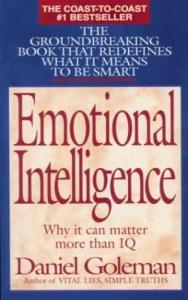Being called out on the Reactor blog to describe emotional intelligence took me a while to absorb, and it took a bit longer for me to realize that we are indeed speaking purely about psychology. So, I am now on my couch, turning on some chill music while writing this. Of course, not being a psychologist does not help build credibility (legal disclaimer)! After reading Daniel Goleman's Emotional Intelligence for a class, my own thoughts on emotional intelligence--in a nutshell--are that technology has penetrated our lives so deeply and in so many ways, that we're testing and developing our emotional intelligence in ways it hasn't been before. Technology has evolved at such a rapid pace that our biological evolution has not had time to catch up, which means performance in the area of EI is variable and plays a part in determining how fulfilling our professional and personal lives will be. The case is made that some behaviors once critical for the human species' survival, are now irrelevant. One example might be the fight or flight response--at least in its traditional sense. In today's society, if one fails an exam, he or she may be encouraged to keep learning, try again, or "fight". In contrast, a human during prehistoric times may choose "flight" when confronted with a predator he or she had never before encountered.

Goleman's model of Emotional Intelligence centers around 4 key constructs:
- Self-awareness - the ability to read one's emotions and recognize their impact while using gut feelings to guide decisions.
- Self-management - involves controlling one's emotions and impulses and adapting to changing circumstances.
- Social awareness - the ability to sense, understand, and react to others' emotions while comprehending social networks.
- Relationship management - the ability to inspire, influences, and develop others while managing conflict
Here's an excellent summary of the book. So how is emotional intelligence relevant in today's organization? How can we instill values around emotional intelligence in today's leaders? An interview (via HarvardBusiness) with Daniel Goleman explains emotional intelligence and social intelligence and how they can be used to improve your own and your organization's performance (video above).
How aware of emotional intelligence are you?
Do you consider yourself a good listener?
Related articles by Zemanta
- Emotional intelligance (slideshare.net)
- Your Emotional Intelligence (EQ) Wins Your Beloved For You (selfimprovementbase.com)
- Do You Manage People or Are You "Just In Charge?" (christinahaxton.wordpress.com)
- Emotional Intelligence - 4 Techniques To Help You Live A Better Life! (selfimprovementbase.com)



Comments
I see this working with executive teams all of the time. The personal mind whirl of multi-tasking (technology overload) is clouding the ability to connect on teams in a meaningful way. I recently did a blog-post on just that: <a href="http://www.reneevations.com/emotional-intelligence/effective-team-leaders/" target="_blank">http://www.reneevations.com/emotional-intelligenc...</a>. Leaders and executives who choose to develop their emotional intelligence will not only score big on the invisible balance sheet but their companies will benefit from increased talent retention. Thank you for this post - I look forward to more. Renée Safrata
According to the poll over at RC's original post, 46% are INTJ's. In some reports, it is estimated that this group occupies only 2-4% of the populace! So, conclusion 1 is we are weird which doesn't bode well for how we are perceived. Secondly, "INTJ's, in the absence of properly developing their communication abilities, may become abrupt and short with people, and isolationists. Conclusion 2 - not the stuff of leaders. Wait, what? INTJ's are also considered masterminds (in planning and adeptness in facing complexities, with formulaic perfectionist precision brought to bear (I like making it sound like we are warriors...) Conclusion - Our cognitive skills (we must have them, we're ChE's!) must be brought to bear on our innate introversion to rise above. Folks, we are at war with ourselves!
Read "Primal Leadership" not too long ago - another excellent book by Goleman. Read it for an MBA class on Leadership and it brought to light the dysfunctional leadership at my former employer. Some of their financial woes were not necessarily self-inflicted, but their ability to weather the storm and rise above was most definitely affected by a CEO and senior management team that is enamored with their own wondefulness, leaving a workforce with poor morale.
@David - You make an interesting point about technology changing our emotional intelligence requirements. I'd venture to say that the explosion of tech communication obviously doesn't change our face-to-face requirements for emotional intelligence, but perhaps instead it makes it more difficult for us to know where certain social boundaries are appropriate. Thanks for the post! @Tom - I think that the situation you describe (i.e. upper management who are enamoured with themselves) is altogether too common in organizations. I wonder if the intense focus on leadership qualities that seems to be present in this cohort of entry/junior/intermediate level professionals might change that tendency. We can hope, right?
@Aurian - interesting comment. In a similar, typical MBA class, we read a good easy to read book titled "On becoming a leader" , <a href="http://www.bizsum.com/OnBecomingALeader.htm" target="_blank">http://www.bizsum.com/OnBecomingALeader.htm</a> , The basic message was that mastery of context was the key .... easier said then done. @Tom I only have read this one Goleman book, but would read another if it is short....The last book I read was "How The Might Fall" by Jim Collins. That was short, interesting, and easy to read.
Thanks David for taking time and posting this blog. I enjoyed the video too. I hope I can find more of his videos/interview on you tube.
[...] question is prompted by a post on Chenected, a site for chemical engineers. The writer gives a cursory review of Daniel Goleman’s ideas [...]